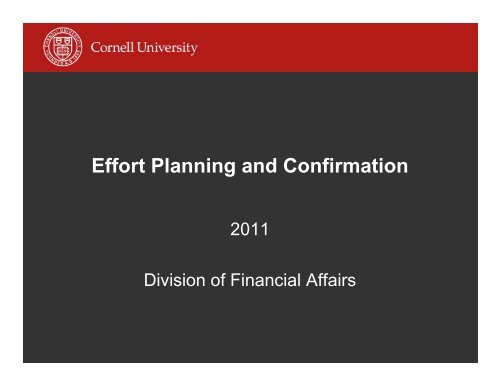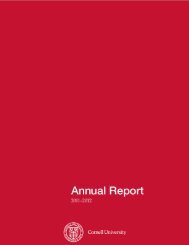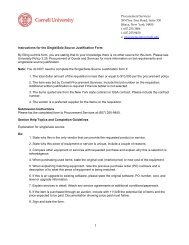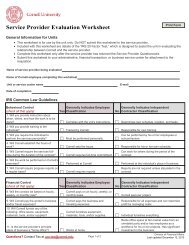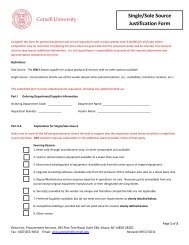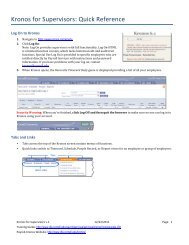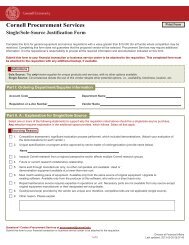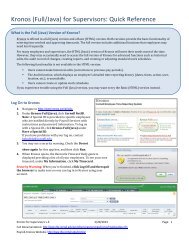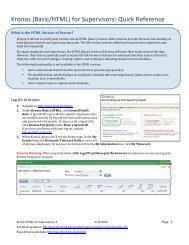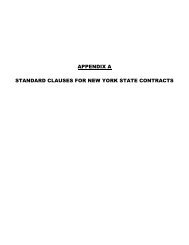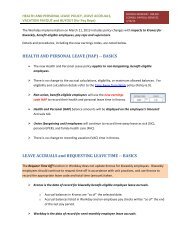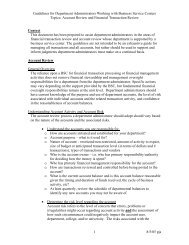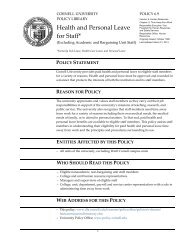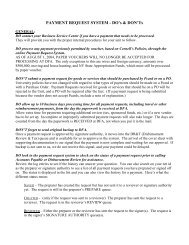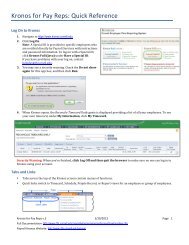Effort Certification - Cornell University
Effort Certification - Cornell University
Effort Certification - Cornell University
- No tags were found...
Create successful ePaper yourself
Turn your PDF publications into a flip-book with our unique Google optimized e-Paper software.
<strong>Effort</strong> Planning and Confirmation2011Division of Financial Affairs
What is “<strong>Effort</strong> <strong>Certification</strong>”• OMB Circular A-21 (section J.10.b.(1)(e) requires “atleast annually a statement will be signed by the employee, principali investigator, or responsible official(s) using suitable means ofverification that the work was performed, stating that salaries andwages charged to sponsored agreements … or other categories arereasonable in relation to work performed.”• Data must “be incorporated into the official records ofthe institution.”• <strong>Cornell</strong> <strong>University</strong> policy 3.11, modified in 2009,implements A-21 and other federal and grantrequirements.
Why the continued focus on effort?• <strong>Effort</strong> is 80% of the cost of sponsored research.– Only 61% here, but still almost $200M (FY08)• Ranked as #1 risk to <strong>Cornell</strong> by the Risk Council• Among the top issues for federal auditors– “Our review disclosed d that t <strong>Cornell</strong> generally has a wellestablished and sound Federal grants management system. Ourreview of 30 sampled employees found no specificmisstatements of effort, but the <strong>University</strong> allowed labor costscharged to NSF awards be certified by employees without t firsthand knowledge or a suitable means of verification. Specifically,our audit found the labor costs for 8 of the 30 sampledemployees, representing 19 percent of the salaries reviewed,were inadequately certified.”from http://www.nsf.gov/oig/09_1_008_cornell.pdf
Risks of Non-Compliance• Severe penalties or funding disallowancescould result from inaccurate, incomplete, oruntimely effort reporting.• <strong>Cornell</strong> or PI could be put on probationary,debarred, or special status which could affectfuture funding• Could require more stringent reportingrequirements• Could lose expanded authority status
Frequently raised concerns• Everyone:– <strong>Certification</strong> must represent actual effort, not budgeted effort.– Breaks in certification– Total commitment– All of a person’s compensated activities, including teaching,committee memberships, administrative duties, etc. cannotexceed 100% and must be factored into the overallallocation of time.– Individuals must know the project on which they are workingand from what funds they are paid.
More Concerns• Faculty and/or Principal Investigators:– Summer salary. Only for project work during summer.– Institutional roles, proposal preparation, are not grant costs!– Over commitment• Has a person promised more than 100% to sponsors– Sponsor commitments• Are commitments being met?• Reduction of PI effort by greater than 25% (i.e. from 50% to37.5%) requires sponsor approval.• Graduate students and postdocs– Must be monitored just like other staff, despite independence.– Only stipend payments to GRAs are reflected on form.• Tuition should follow same distribution.
Ongoing g Monitoring• Entire process should be addressed by documented ongoingmonitoring, followed by documented year-end end verification.• An ADAF must be submitted in a timely manner when it isrecognized that effort component changes more than ± 10%.– Changes the payroll distribution and modifies the “plan plan. ”– Per A-21: “Short term (such as one or two months) fluctuationbetween workload categories need not be considered as long asthe distribution of salaries and wages is reasonable over the longerterm.• Units need to coordinate with other units when:– Distributions cross unit lines and involve multiple supervisors– Individuals have multiple positions (will generate multiplecertifications)
ADAF <strong>Certification</strong>
Special situations• NIH salary cap– Affects anyone paid all or in part on NIH funds, with FY11 pay rategreater than $149,775 (9 mo) or $199,700 (12 mo)– Creates a cost sharing requirement that must be recorded via an inbaselinked cost sharing account.– An issue for both academic year and summer payments.• NSF Limits– Normally only two months per fiscal year professorial support fromall NSF awards combined, including subawards, unless stated t inaward documents.• Obtain certification by departing faculty prior to departure
<strong>Cornell</strong> Process• Plan Confirmation Process utilized– Only for those individuals id charged to sponsored activities,itifederal appropriations, cost sharing, or organized researchaccounts (temps and students who use time cards areexcluded).– Plan based on current year actual or CPBS data.– June report contains YTD FY11 salaries and wages from allsources for those individuals requiring certification.• Only <strong>Cornell</strong>-compensated activities are included.– Some types of supplemental compensation for incidentalwork, or other types of taxable reimbursements, may beexcluded.
What is being certified?• <strong>Effort</strong> is the total time spent conducting universitybusiness irrespective of normal work schedules.• <strong>Certification</strong> must incorporate activity on allsponsored projects and all institutional activity statedas a percentage.• Reports are based on 100% effort, not hours, weeksor other method.- Whether an individual works 20 or 60 hours a week,the total effort reported for that individual is 100%.
What is being certified?• Was the personal compensation allocable tothe account charged?• Was it in proportion p to the effort provided?• Is it in the right cost base?• Is cost shared effort documented?– For faculty and senior researchers only mandatory andvoluntary committed cost sharing should be recorded.Voluntary uncommitted effort for faculty and seniorresearchers may remain in the instruction base inaccordance with the January 2001 A-21 clarification.
What needs to be done first?• Units should be reviewing effort throughout the year.– Reports are produced monthly via the Hyperion Brio Portal.– Contact Cost Analysis if you are having trouble accessingthe reports. Contact brio-hyperion-admin-supp@cornell.eduif you are having problems with Brio• ADAFs must be prepared and received by Payroll nolater than June 20, 2011 for any changes that need tobe reflected in the final reports, or for futuredistribution.– Note: changes are subject to the recently revised Policy3.20, Cost Transfers on Sponsored Projects
Who should sign?• <strong>Cornell</strong> permits certification by individuals, principalinvestigators, departmental administrators or, per A-21, anyone having “suitable means of verification thatthe work was performed.”• “Verification” must be obtained and documentedwhen using anything other than individualcertification.• Person who signs, and the principal investigator, areultimately responsible for expenses on sponsoredprojects.• Regardless of who signs, the Principal Investigatormust be aware of, and understand, the effortcertification process.
Certifying Signature• The signer must understand what they are signingand “know” the effort• If the individual is not signing their own effort report,the signer must be as close as possible to the workperformed (e.g. Direct Supervisor).• Business managers cannot sign for entire departmentunless they have used ‘suitable means”.• The signer is taking responsibility for certifying i that tthe information is correct on the report.
Suitable Means – Definition• The process through which one receives assurancethat effort was provided as stated so that an effortcertification may be approved by an individual nothaving firsthand knowledge. Suitable means ofverification requires the documented review by anindividual, such as the PI, project manager,supervisor, or an employee who has firsthandknowledge that the work was performed.
Suitable Means – What Does it Mean?• PI sub-certifications• Interviewing and documenting conversations withPI’s or other staff regarding effort on their awards• Review of time cards (throughout the year) includingtechnicians, student employees, and others• Project effort recording system maintained by unit• All documentation must be retained by unit, and issubject to audit.
Suitable Means – What It Doesn’t Mean?• “Negative confirmation”– “PI always tells us if there is a problem.”• Certified individuals because that is how they wereappointed– Must review actual charges not commitments• <strong>Certification</strong> based on allocation of academicappointment• Review of labor distribution reports
How to do the certification?• Units should await notification from Cost and CapitalAssets that the final reports are available and correct.• Reports should be generated and reviewed as soonas they are available.• Units must print and return one of the three reports.– Please choose one report to return– Return entire unit’s certification together– Return in page number order– Reports with filters will not be accepted.
How to do the certification?• Make changes to plan and actual data as necessary.• (Note: Most changes should have been made in the priormonth from the May reports)• ADAF changes must be updated on the report (both% and salary distribution)• Signed final certifications, along with ADAFs forchanges made, must be submitted no later than July31st.• DFA must notify appropriate officers (i.e. unit heads,college business officer) when certifications aredelinquent.
Method used must benoted on groupcertification form.
References• Hyperion Brio Portal– https://brio.cit.cornell.edu/Brio/browse/Main• Annual <strong>Certification</strong> Process– http://www.dfa.cornell.edu/dfa/accounting/topics/costanalysis/effort.cfm• Policy 3.11, <strong>Effort</strong> Planning and Confirmation– http://www.dfa.cornell.edu/dfa/treasurer/policyoffice/policies/volumes/financed /dfa/treas rer/polic office/policies/ ol e/effort.cfm• OMB Circular A-21– http://www.whitehouse.gov/omb/circulars/a021/a21_2004.html
Assistance• uco-cost-mailbox@cornell.edu• Nancy Abbott, Manager, Cost and CapitalAssets, nja3@cornell.edu, 5-9368• Debbie Littlejohn, Cost Analyst, Cost andCapital Assets. djl258@cornell.edu, 5-9402
You may need to change your password, butyou can use your current password if it meetsthe requirements.
Use “CTRL” andarrow keys to selectmore than one college.Use “CTRL” or “All”button to select more thanone Department.
“Remove” clears the highlighted filter only.“Clear” removes all filters.


